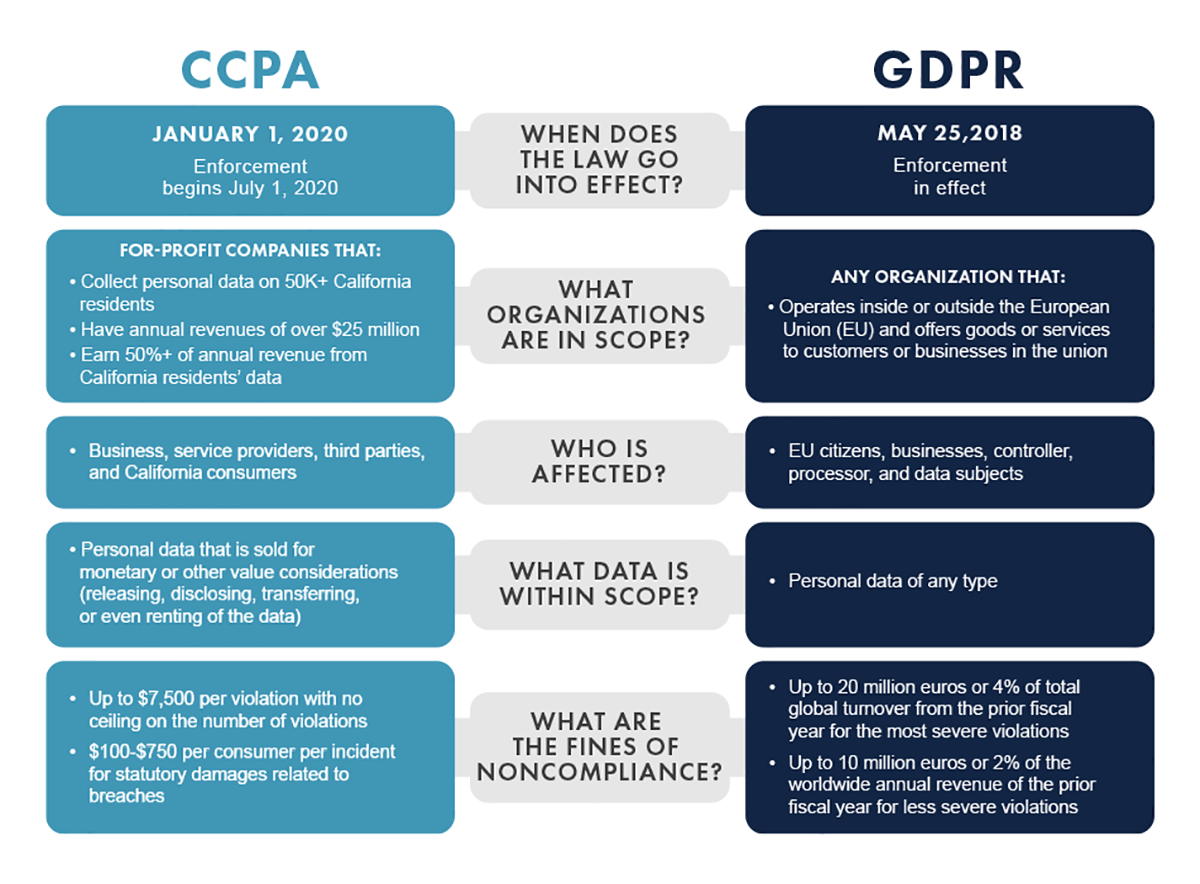Privacy rules are more crucial than ever in the digital age. They’re meant to safeguard people’s personal info and grant them control over how their data is collected and used. Two major rules in this arena are the General Data Protection Regulation (GDPR) and the California Consumer Privacy Act (CCPA). These rules have a big impact on the affiliate marketing industry, influencing how marketers operate and handle user data.
GDPR and CCPA
The GDPR, which took effect in May 2018, is a comprehensive data protection regulation that applies to businesses collecting and processing personal data of EU citizens. Its goal is to give individuals more say over their data and bolster their privacy rights.
Likewise, the CCPA, put into action in January 2020, is a California state regulation that provides residents with certain rights regarding the collection and use of their personal information.
Both the GDPR and CCPA stress the importance of getting informed consent from users before collecting and processing their personal info. This means that affiliates have to be clear about what data they’re gathering, how it’ll be used, and offer an opt-out option for those who don’t want to share their info.
Also, the GDPR and CCPA demand that affiliates implement measures to safeguard user data. They need to have appropriate security measures in place to prevent unauthorized access to personal info and promptly respond to any data breaches.
Key requirements of the GDPR and CCPA in affiliate marketing
Let’s delve into the main provisions of the GDPR and CCPA that affect affiliate marketing:
Consent and transparency
Both the GDPR and CCPA emphasize the importance of obtaining user consent and ensuring transparency regarding data collection and processing practices. Affiliate marketers must:
- clearly state the purpose of data collection
- disclose the types of data being collected
- explain how that data will be used
- provide an option to opt-in or opt-out of data sharing
Data minimization and purpose limitation
The GDPR and CCPA promote the principle of data minimization and purpose limitation. Affiliate marketers are required to collect only the necessary and relevant data for the intended purpose. Excessive or unrelated data collection is discouraged, and marketers must clearly specify the purpose for which the data is being collected and ensure that it aligns with their marketing activities.
Security measures and data breach response
Both regulations stress the importance of implementing robust security measures to protect user data. Affiliate marketers must have appropriate technical and organizational measures in place to safeguard personal information from unauthorized access, loss, or misuse. In the event of a data breach, marketers are required to promptly notify users and relevant authorities, taking necessary steps to mitigate the impact and prevent future breaches.
User rights and control
The GDPR and CCPA grant users certain rights over their personal data. These include the right to access, rectify, and erase their information, as well as the right to object to certain processing activities. Affiliate marketers must provide mechanisms for users to exercise these rights effectively and ensure that they have control over their own data.
Third-party data sharing
Affiliate marketers often share user data with third parties to enhance marketing activities. Both the GDPR and CCPA require marketers to enter into appropriate agreements with these third parties, ensuring that their data processing activities comply with the regulations. Marketers must also inform users about the third parties involved and obtain explicit consent for such data sharing.
Practical tips for complying with the GDPR and CCPA
In order for affiliate marketers to comply with the GDPR and CCPA regulations, it is important to follow certain steps and guidelines.
Obtaining explicit consent
To collect personal data from users, it is crucial to obtain their explicit consent:
- Clearly explain the purpose of data collection. Ensure that users understand why their personal data is being collected.
- Avoid complicated jargon or confusing statements. Use language that is easy for users to understand.
- Implement a clear affirmative action. Allow users to actively opt in and give their consent. Avoid pre-ticked checkboxes or implied consent.
- Provide a granular consent option. Give users the opportunity to choose the specific types of data they are willing to share.
Limit data collection
Affiliate marketers should ensure that data collection is limited to what is necessary for the campaign:
- Avoid asking for excessive personal information. Stick to collecting necessary data to achieve the campaign’s objectives.
- Regularly review data collection practices: Periodically assess the necessity of collected data and remove any unnecessary or outdated info.
Privacy and cookie policy updates
Updating privacy and cookie policies is crucial to align with GDPR and CCPA requirements:
- Clearly state data practices. Outline the types of personal data collected, how they will be used, and the legal basis for processing such data.
- Provide cookie consent options. Implement a mechanism that allows users to control and manage their cookie preferences. Provide clear instructions on how to opt-out if desired.
- Assess and update third-party data sharing. Review and update the list of third-party services that have access to user data, ensuring they are compliant with GDPR and CCPA requirements.
Secure handling and storage of user data
Affiliate marketers must handle and store user data securely:
- Implement data encryption. Utilize robust encryption methods to protect personal data, both in transit and at rest.
- Establish access controls. Only authorized personnel should have access to user data. Implement strict access controls and regularly review permissions.
- Define appropriate retention periods. Establish and adhere to retention periods for user data, disposing of it securely when it is no longer necessary.
Potential impact of GDPR and CCPA on affiliate marketing
On the bright side, the GDPR and CCPA laws could actually bring some positive changes to affiliate marketing. Both the GDPR and CCPA stress the importance of transparency and user consent. This means that affiliate marketers will have to be upfront about the data they collect and how they use it. This increased transparency could build trust between advertisers, affiliates, and consumers.
These regulations also encourage marketers to focus more on user privacy and providing valuable content. With the need for user consent, affiliates may start building real relationships with their audience. This shift towards valuable content and personalized experiences can lead to a better user journey, benefiting everyone involved.
But, let’s not ignore the challenges. The GDPR and CCPA require organizations to review their data practices, which can add complexity and costs. Small affiliates and businesses may struggle the most because they might not have the resources to comply fully.
Another challenge is that affiliates rely on tracking technologies to measure conversions accurately. But, these regulations have strict rules about using cookies and other tracking tools. This could make it difficult for affiliates to track conversions and attribute them correctly, affecting their performance and revenue.
Final thoughts
Basically, the GDPR and CCPA require businesses to get permission from people before collecting their personal data. This is to protect people’s privacy and give them more control over their own information. If companies don’t follow these rules, they can face major consequences and damage their reputation.
Privacy rules are changing all the time, and people want even more control over their data. This presents challenges and opportunities for the affiliate marketing industry. If affiliate marketers can adapt to these changes and take an ethical approach to collecting and using data, they can be leaders in their field. They can show they care about privacy and stand out in a market that values honesty and fairness.
If you want to reach new GEOs and audiences, maybe it is all waiting for you on Telegram? We’ve prepared some material about Telegram audiences. What are the messenger’s users like this year? How old they are, what they do, and what they are interested in!








